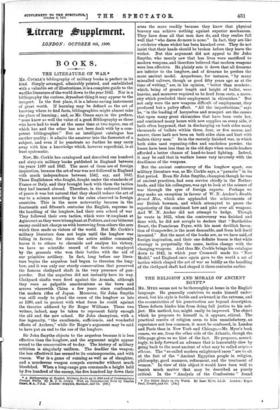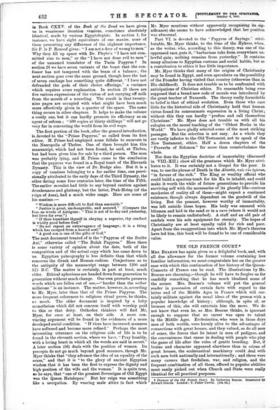THE RELIGION AND MORALS OF ANCIENT EGYPT.*
MR. MYER seems not to be thoroughly at home in the English language. He generally contrives to make himself under- stood, but his style is feeble and awkward in the extreme, and the eccentricities of his punctuation are beyond description. These defects hinder him from doing full justice to his sub- ject. His method, too, might easily be improved. The object which he proposes to himself is, it appears, ethical. The practical results of religion seem to him unsatisfactory, an experience not less common, it must be confessed, in London and Paris than in New York and Chicago,—Mr. Myer's book comes, we see, from the other side of the Atlantic, though the title-page gives us no hint of the fact. He proposes, accord- ingly, to help forward an advance that is lamentably slow by going back to the most ancient of what may be called engines ethicae. The "so-called modern enlightened races" are to sit at the feet of the "Ancient Egyptian people in religion, philosophy, good manners, refinement, and the treatment of women." In view of this object it would have been well to banish much matter that may be described as purely critical. In the "Analysis of the Confessions" found • The Oldest Books in the World. By Isaac Myer, LL.D. London: Kesan Paul, Trench, and Co. Ms.] in Book CXXV. of the Book of the Dead we have given us in wearisome iteration versions, sometimes absolutely identical, made by various Egyptologists. In section 1, for instance, we have eight equivalents of one maxim, none of them presenting any difference of the slightest importance. Sir P. le P. Ren.ouf gives: "I am not a doer of wrong to men." Why then fill up space with Dr. Pleyte's "I have not com- mitted sins to men," or the "I have not done evil to men" of the unnamed translator of the Turin Papyrus P In section 26 we have seven variants of the boast that the con- fessor has not tampered with the beam of a balance ; the next section goes over the same ground, though here the last of seven readings has something quite different, "I have not defrauded the gods of their choice offerings," a variance which requires some explanation. In section 28 there are five various expressions of the virtue of not carrying off milk from the mouth of a nurseling. The result is that twenty- nine pages are occupied with what might have been much more effectively given in a quarter of the space. The same thing occurs in other chapters. It helps to make the volume a costly one, but it can hardly promote its efficiency as an agent of reform ; "500 copies at thirty shillings" will not go very far in converting the world from its evil ways.
The first portion of the book, after the general introduction, is devoted to the "Prime Papyrus," so called from its first editor. M. Prisse had employed some fellahs to excavate in the Necropolis of Thebes. One of them brought him this manuscript, which had not been found, he said, at Thebes, but had been given him for sale by a third person. The man was probably lying, and M. Prisse came to the conclusion that the papyrus was found in a Royal tomb of the Eleventh
Dynasty. This is the view of Dr. Budge also. But it is a copy of treatises belonging to a far earlier time, one provi- sionally attributed to the early days of the Third Dynasty, the other dating some four centuries later, the time of the Fifth.
The earlier moralist had little to say beyond caution against drunkenness and gluttony, but the latter, Ptah-Hotep (of the reign of Assa), had a much wider range. Here are some of his maxims --
"Wisdom is more difficult to find than emeralds."
"Justice is great, unchangeable, and assured." (Compare the fain ma words of Antigone : "This is not of to-day and yesterday, but lives for ever.") "If thou humblest thyself in obeying a superior, thy conduct is wholly good before God."
"Do not repeat an extravagance of language; it is a thing which has escaped from a heated soul." "A good son is one of the gifts of God."
The next document treated of is the "Papyrus of the Scribe Ani," otherwise called "The Bulak Papyrus." Here there is some variety of opinion about the date, both of the composition and of the actual copy which has come down to us. Egyptian paheography is less definite than that which concerns the Greek and Roman codices. Conjectures as to the antiquity of the manuscript range between 1200 and 525* B.C. The matter is certainly, in part at least, much older. Ethical aphorisms are handed down from generation to
generation without much change. Our own proverbs preserve words which are fallen out of use,—" harder than the nether
millstone" is an instance. The matter, however, is, according to Mr. Myer, later than that of the Prisse Papyrus. The more frequent references to religious ritual prove, he thinks, so much. The older document is inspired by a lofty monotheism which did not concern itself with worship paid to this or that deity. Orthodox thinkers will find Mr. Myer, for once at least, on their side. A more con- vincing argument will be found in the evidences of a more developed social condition. "If vices have increased, manners have softened and become more refined." Perhaps the most interesting utterance on the religious side of life is to be found in the eleventh section, where we have, "Pray humbly, with a loving heart in which all the words are said in secret." A later section (56) deals with the position of women. Its precepts do not go much beyond good manners, though Mr. Myer thinks that "they advance the idea of an equality of the sexes," and that it is "to the glory of ancient Egyptian wisdom that it has been the first to express the dignity and high position of the wife and the woman." It is quite true, as he says, that "one of the greatest Sovereigns of Old Egypt was the Queen Hatshepsu." But her reign was something like a usurpation. By wearing male attire (a fact which
Mr. Myer mentions without apparently recognising its sig. nificance) she seems to have acknowledged that her position was abnormal.
Part VI. is devoted to the "Papyrus of Sayings," attn. butable, Mr..Myer thinks, to the time of the Hyksos, When, as the writer, who, according to this theory, was one of the oppressed race, puts it, "barbarians take from everywhere us- lawful gain; nothing remains from yesterday.". It contains many allusions to Egyptian customs and social habits, but as a contribution to ethics it has little importance.
Mr. Myer thinks that many of the origins of Christianity may be found in Egypt, and even speculates on the possibility of the Founder having visited that country (otherwise than in His childhood). It does not trouble us to be confronted with anticipations of Christian ethics. No reasonable being ever supposed that a brand-new code of morals was introduced by the great teacher of Nazareth. The theory really formidable to belief is that of ethical evolution. Even those who care little for the historical side of Christianity hold that human virtue found its consummate expression in a living Christ; without this they can hardly "profess and call themselves Christians." Mr. Myer does not trouble us with all his eulogies on the moral teaching of the "Oldest Books in the World." We have gladly selected some of the most striking passages. But the selection is not easy. As a whore they are vastly inferior to the Old Testament, not to speak of the New Testament, ethics. Half a dozen chapters of the "Proverbs of Solomon" far more than counterbalance the whole.
Nor does the Egyptian doctrine of immortality (discussed in VIII.-X1r.) show all the greatness which Mr. Myer attri- butes to it. It was certainly not a Gospel for the poor. It was, to use the phrase of Death in the Alcestis, TrpOc r7Js ivirrar, "in favour of the rich." The King or wealthy official who could build a spacious tomb for his Ka to inhabit, and could make it worth the while of future generations to provide his surviving self with the necessaries of its ghostly life—curious mockeries of reality all of them—might expect a continued existence, though always dependent on the goodwill of the living. But the peasant, however worthy of immortality, was left outside these hopes. His body was smeared with bitumen and laid in the sand or in a cave (where it would not be likely to remain undisturbed). A staff and an old pair of sandals were his sole equipment for eternity. The hopes of Christianity are at least equally valid for rich and poor. Apart from the exaggerations into which Mr. Myer's theories have led him, this book will be found to be one of considerable value.



















































 Previous page
Previous page